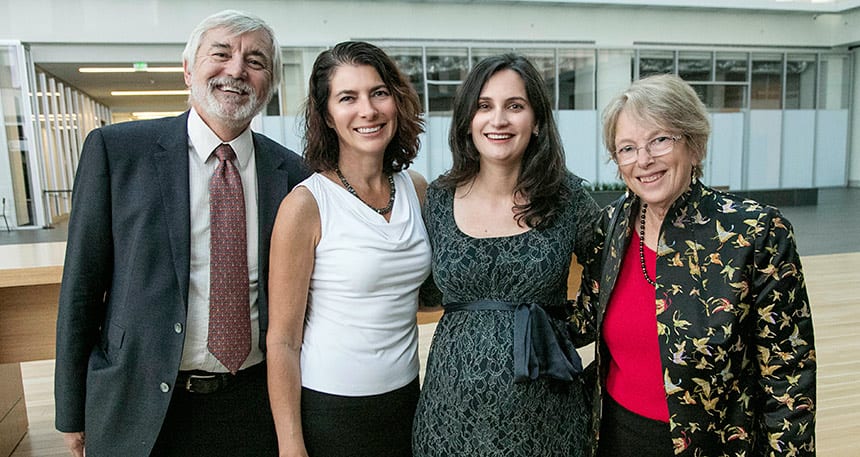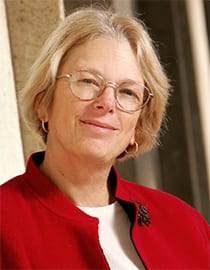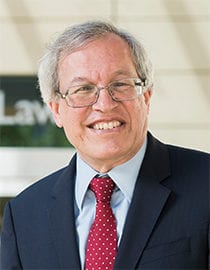
By Gwyneth K. Shaw
The endowing donors of the Samuelson Law, Technology & Public Policy Clinic have again stepped forward, this time to fund Berkeley Law’s first chair for clinical faculty.
Professor Pamela Samuelson and her husband, Robert Glushko, of the UC Berkeley Cognitive Science Program, have pledged $1 million to create the Robert Glushko Clinical Professor of Practice in Technology Law. Two decades earlier, they donated $2 million to help establish the Samuelson Clinic, then the first of its kind, to advance the public interest in tech and intellectual property law.
The clinic has been training the next generation of lawyers to recognize and advance the public interest where law meets technology ever since — and, more recently, with a cross-cutting focus on civil liberties, intellectual property, and criminal justice.
“My husband Bob Glushko has been very supportive of the technology clinic at Berkeley which bears my name, so one motivation is to honor him for this support of the tech clinic movement,” Samuelson says. “Another motivation is to express the pride we both feel about the work the technology clinic faculty and students have done to advance the public interest in the past 21 years.”

Samuelson, a faculty co-director of the Berkeley Center for Law & Technology, is a trailblazer in digital copyright law, intellectual property, cyberlaw, and information policy. A Berkeley Law and UC Berkeley School of Information faculty member since 1996, she’s on the board of directors for the Electronic Frontier Foundation and a co-founder and board member of Authors Alliance, a nonprofit that aims to promote the progress of knowledge by supporting authors who want their works to be more widely available.
Glushko became an adjunct professor at Berkeley in 2002 after decades of research and entrepreneurship in digital publishing and electronic commerce. He co-founded Veo Systems, which pioneered the use of Extensible Markup Language (XML) for web services and business applications. He has also made substantial contributions to the Cognitive Science Society by endowing annual prizes for distinguished scientists and for new Ph.Ds.
In just the past year, the clinic has pushed the Federal Bureau of Prisons to force disclosure of records about its monitoring of confidential attorney-client emails; pushed for the removal of copyright restrictions on California’s jury instructions; and produced reports on electronic monitoring in the juvenile justice system and surveillance laws in cities.
Clinic Director Catherine Crump is a nationally recognized expert on the way governments — at the local, state, and federal level — are surreptitiously watching their citizens using new technologies, often without their knowledge. Associate Director Erik Stallman ’03 is an open internet proponent who scrutinizes the rise of artificial intelligence. Clinical Director of Policy Initiatives Jennifer Urban ’00 just took over as chair of the new California Privacy Protection Agency.
“It’s impossible to overstate how important Pam and Bob have been not just in supporting the clinic here at Berkeley Law, but really in cementing the place of tech law among clinical offerings at law schools nationwide,” Crump says. “They were early proponents of including tech law in clinical education, and have supported not only the Berkeley clinic but others around the country. At this point, their idea has become so mainstream that people are more likely to ask why a school doesn’t have a tech law clinic than to question why one does.”
Powering performance
Students who’ve worked with the clinic crowd the tech law landscape, from Silicon Valley’s powerhouses to a slew of public-interest firms and organizations. That record of excellence is another driver for this additional gift as the clinic moves into its third decade, Samuelson explains.
“Students often tell me that the tech clinic is one reason they chose Berkeley over other top schools,” she says. “The tech clinic offers students the chance to deepen their understanding of the public interests at stake in technology law and policy, to engage in cutting-edge work to advance these public interests, to work with clients for whom their projects matter, as well as to refine their lawyering skills.”

Dean Erwin Chemerinsky says this donation is especially meaningful for the school because it comes from a pair with such a long history at Berkeley.
“I am deeply grateful to the continued extraordinary generosity of Bob Glushko and Pam Samuelson, who endowed this chair for a clinical professor in the Samuelson Clinic for Law Technology & Public Policy,” he says. “This is the first chair created for a clinical professor at Berkeley. The clinics are such a vital and outstanding part of Berkeley Law and this further strengthens them.”
Crump says she, Urban, and Stallman were thrilled to learn of the gift.
“They have been generous supporters of the clinic for years, and continually interested in our work, but this new gift was really above and beyond,” she says. By creating Berkeley Law’s first chair designated for a clinical faculty member, Crump adds that “it’s really another step towards recognizing how important clinical education is in what law schools offer students.”
Samuelson says she hopes the endowed chair will be the first of many to recognize the achievements of the school’s clinical faculty.
“If it motivates more such gifts, that would be wonderful,” she says. “In the meantime, though, it will honor the accomplishments and further raise prestige of the tech clinicians at Berkeley Law.”